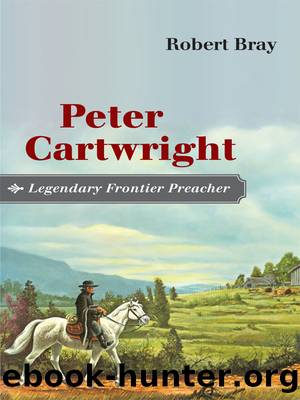Peter Cartwright, Legendary Frontier Preacher by Robert Bray

Author:Robert Bray [Bray, Robert]
Language: eng
Format: epub
Tags: History, General, United States, 19th Century
ISBN: 9780252090592
Google: YqBXrzhufSoC
Publisher: University of Illinois Press
Published: 2010-10-01T00:37:13+00:00
CHAPTER 7
Perishing
And remember!âa Methodist preacher is to mind every point,
great and small, in the Methodist discipline!
The general conference of 1836 convened in Cincinnati on Monday, May 2, with Cartwright back in his delegated place after having missed 1832.1 He found himself sitting figuratively if not literally smack between the New England abolitionists, who were now demanding immediate and unconditional adherence to the Disciplineâs rule on slavery, and the southern apologists, who were increasingly adopting the latest political ideology back home, namely, that slavery, heretofore a ânecessaryâ evil, was actually a good thingâfor the owned as well as the owners. Cartwright continued to have no use for either âultraâ party and was dismayed at the hardening of radical positions over the eight years since his last national convention. He thought the radicalsâ animosities would, if unchecked by political moderation, sunder the Church and even the nation. Among the abolitionists, Cartwright singled out for opprobrium Orange Scott, âa disciple of [William Lloyd] Garrison,â2 and among the southerners William Smith. What galled him most was their fanatical unwillingness to compromise even to save the Church, their insistence that their ends were sanctified and therefore justified radical means. And by compromise, Cartwright meant bending âexternalâ principles (slavery is a âmoral evilâ and ought to be immediately abolished; slavery is a âpositive goodâ for those enslaved and has a ârightâ to exist) toward the fixed principle of the Discipline: that every Methodist traveling preacher had a duty to keep clear of owning slaves.
A Virginian delegate in Cincinnati, John Early, invited Cartwright to attend a private âsouthern caucusâ whose agenda was to form a plan of disunion should the general conference refuse to amend the Discipline to tolerate slavery where it constitutionally existed. âThis movement was headed by the Rev. William A. Smith, of Virginia, and others of the same cloth and kidney ⦠Some of them took strong ground, and urged a division, or separation from the Methodist Episcopal Church. Others of them said they would never consent to a division; that they would rather suffer martyrdom than to divide the Church.â Smith told Cartwright that this was only a matter of time: âHe would never be satisfied unless we would agree to expunge every thing from the Discipline ⦠on the subject of slavery.â But on this point Cartwright was forced to agree with the abolitionists: in all good faith and principle, it simply could not be done (361).
But why was he present at a southern caucus in the first place? He was a well-known moderate on the slavery issue, but perhaps Early, Smith and the others hoped he might be counted on to support not schism (never!) but the election of a southern bishop, slaveholder or not. Though this is not at all the scene as portrayed in the Autobiography, it is precisely the way the editor of the Nashville Christian Advocate (John B. McFerrin, no friend of Cartwrightâs) remembered the 1836 meeting in 1857:
The first time we ever saw him was at the General Conference in the year 1836.
Download
This site does not store any files on its server. We only index and link to content provided by other sites. Please contact the content providers to delete copyright contents if any and email us, we'll remove relevant links or contents immediately.
| Baptist | Book of Common Prayer |
| Calvinist | Episcopalian |
| Inspirational | Lutheran |
| Methodist | Pentecostal & Charismatic |
| Presbyterian | Quaker |
| Seventh-Day Adventist | Shaker |
| Theology |
Fangirl by Rainbow Rowell(9208)
How to Bang a Billionaire by Alexis Hall(8125)
Wonder by R. J. Palacio(8084)
The Space Between by Michelle L. Teichman(6909)
The Thirst by Nesbo Jo(6905)
Assassin’s Fate by Robin Hobb(6183)
Wiseguy by Nicholas Pileggi(5740)
The Night Circus by Erin Morgenstern(5201)
Paper Towns by Green John(5157)
The Kite Runner by Khaled Hosseini(5150)
Bittersweet (True North #1) by Sarina Bowen(4829)
Gerald's Game by Stephen King(4622)
Too Much and Not the Mood by Durga Chew-Bose(4315)
Pillow Thoughts by Courtney Peppernell(4261)
Goodbye Paradise(3786)
Twelve Days of Christmas by Debbie Macomber(3544)
Good by S. Walden(3532)
The Rosie Effect by Graeme Simsion(3444)
The Cellar by Natasha Preston(3313)
